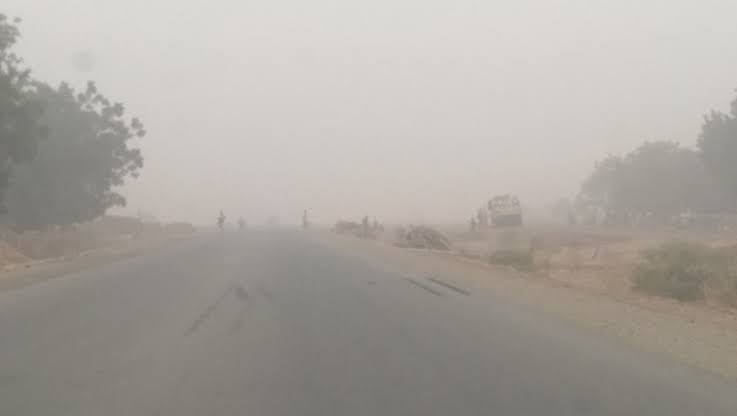Health Experts Counsel On Coping With Harmattan

Harmattan season in Nigeria and other parts of West Africa, which occurs between November and March, is accompanied by dry, dusty and cold northeasterly trade winds from the Sahara Desert.
The cold temperature and atmospheric dust pollution bring about the onset of new diseases and worsen existing ones.
Habiba Ibrahim, a Resident Doctor with University of Abuja Teaching Hospital, told HumAngle that it was a challenging period in the north due to increased rates of allergies, asthma attacks and other respiratory issues.
‘There’s an increased risk of having more frequent and severe cases of respiratory diseases and allergies during harmattan because of the cold, pollens and dust triggers,” Said Fatima Nagari, a Medical Officer at the Ministry of Defence.
She said that skin diseases also occurred during the season with skin dryness, exposure to dust and dirt for some people.
Habiba shared a similar concern about dry skin and dehydration.
“It’s important to stay well-hydrated and covered to reduce the impact of the harsh wind. People need to moisturise regularly and humidify living areas.
“An easy way to do this is to keep a wet cloth or towel in the room. This will reduce dryness and irritation of the throat,” Habiba said.
“Eat a lot of fruits and vegetables to boost immunity and ensure adequate ventilation as much as possible,” she said.
Habiba stated that adhering to COVID-19 safety guidelines, especially wearing face masks and observing hand hygiene would likely help reduce cases of respiratory infections as was usually seen during the harmattan season.
“Physical distancing also ensures ventilation to an extent, so these guidelines should help keep the populace a little healthier,” she said.
Fatima urged people to use a face mask said because it reduced the amount of dust and cold air inhaled.
Support Our Journalism
There are millions of ordinary people affected by conflict in Africa whose stories are missing in the mainstream media. HumAngle is determined to tell those challenging and under-reported stories, hoping that the people impacted by these conflicts will find the safety and security they deserve.
To ensure that we continue to provide public service coverage, we have a small favour to ask you. We want you to be part of our journalistic endeavour by contributing a token to us.
Your donation will further promote a robust, free, and independent media.
Donate HereStay Closer To The Stories That Matter




